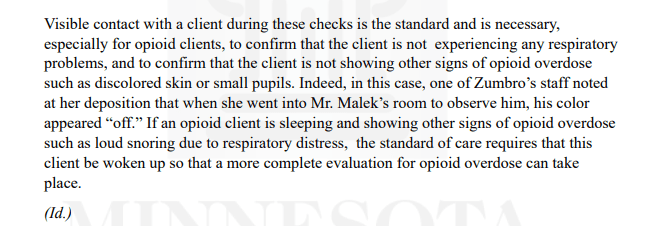Red Wing woman wins $1.5 million suit against Rochester treatment center following son’s death
(ABC 6 News) – $1.5 million: that’s how much a Minnesota mother has been awarded in a lawsuit for the death of her son.
On March 22, two and a half years after Caleb Malek’s overdose death, an Olmsted County jury awarded his mother, Jill Adams, $1.5 million in damages from Zumbro Valley Health Center, where he was receiving detox treatment.
Jill Adams says she’s relieved the trial and her quest for justice for her son is finished.
But she says the fight against opioids is far from over.
RELATED: Rochester overdoses go up 29 percent – ABC 6 News – kaaltv.com
In Northfield High School, many knew Caleb Malek as a star athlete, hard worker and a good person. But as the the pressure on Malek grew, he eventually developed a substance abuse problem.
That’s what brought him to a recovery house in September of 2022, when he was 23 — but the discovery of needles near his room and a positive test for fentanyl, Percocet and THC changed everything.
“So, they gave him an option to either leave, or go to detox for recovery. So he picked to go to recovery or detox,” said Adams.
Malek was immediately transferred to the Zumbro Valley Health Detox Center after his positive drug test, where staff checked on him regularly.
Hours later, he was dead.
That’s when his mom began seeking justice for her son. Adams filed a lawsuit against the facility for failing to recognize the signs of an overdose.
Original lawsuit
According to Adams’ original civil suit, Malek, age 23, checked himself into Doc’s Recovery House and Zumbro Valley Health Center (ZVHC) Sept. 7 for substance abuse treatment.
During his stay in the Recovery House, staff found a needle in Malek’s room and he tested positive for fentanyl, percocet, and THC.
According to court documents, Malek was transferred to ZVHC’s detox center early on the morning of Sept. 10, where staff checked him every 15 minutes between 3:30 and 6:15 a.m., then began checking him at 1/2-hour intervals until 7:30 a.m.
According to court records, staff checked on Malek hourly at 7:30, 8:30, and 9:30 a.m. — until a staff attempted to wake him up for a phone call at 10:15 a.m. and discovered he was not breathing.
He was pronounced dead at 10:42 a.m., after resuscitation failed.
Adams’ suit alleged that Doc’s Recovery House failed to adequately search Malek for drugs on intake, and that ZVHC had not followed its own policy of checking patients every 15 minutes for signs of medical issues, had not recognized that Malek’s “loud storing” around 7 a.m. was actually a sign of respiratory distress, and did not transport Malek to a hospital after he tested positive for fentanyl.

Later documents attested that while ZVHC staff documented checking Malek’s pockets for illicit substances, they did not record a full search of his belongings — suggesting they did not check for any substances he may have taken in the detox center.
Doc’s Recovery House was later removed from the list of defendants.
After a jury trial March 13-22, an Olmsted County jury determined that 60 percent of the responsibility for Malek’s death was attributable to ZVHC, while 40 percent could be attributed to his own actions.
Beth Krehbiel, the Chief Executive Officer for ZVHC, sent ABC 6 News the following statement:
“This has been a difficult journey for everyone involved. While we are disappointed by the verdict, we have great respect for the legal system and the jury’s work. Since 2021, the world has been tragically awakened to the growing presence and danger of fentanyl. Our staff training continues to evolve as new protocols are developed by the medical community.
At the end of the day, we remain confident in the outstanding care and services we provide to support people as they work toward living healthy and fulfilling lives.”
Adams says she was disappointed that ZVHC was not declared fully responsible for Malek’s death — but she’s hopeful that the case will lead to better treatment for people struggling with substance abuse.
She also hopes to continue speaking about the dangers of drug use.
“I try to remind people that it is a disease, and that certain people are wired certain ways. Some people can walk away, and some people can’t, you know. So, I ask for a little bit of grace for people walking in those shoes,” said Adams.
If you or someone you know is struggling with addiction, we have resources (click here)